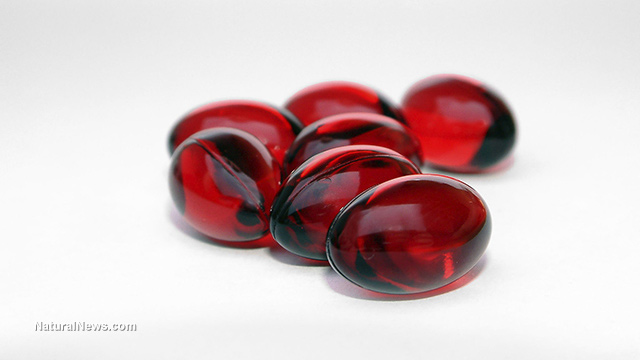Latest research shows astaxanthin to be a powerful anti-aging agent
06/07/2018 / By Michelle Simmons

Astaxanthin was found to be a potent anti-aging agent, according to a mouse study published in the Endocrine Journal.
The study was carried out by a team of researchers from Zhejiang University of Technology in China and Asahikawa Medicine University in Japan who looked at the preventive effects of astaxanthin on aging with the use of an accelerated model. The research team treated mice with both D-galactose and jet lag for six weeks. They grouped the mice into three: Control group; a group treated with a combination of daily sterile D-galactose injection and jet lag; and a group supplemented with a diet containing 0.01 percent astaxanthin, in addition to the D-galactose injection and jet lag. The research team induced jet lag through a 12-hour reversal of the light/dark cycle once every three days.
After the treatment of six weeks, results revealed that astaxanthin supplementation protected liver weight loss in aged mice. The researchers explained that this may be due to the up-regulation of the mRNA expression of galactose-1-phosphate uridyltransferase, which plays a role in the improvement of D-galactose metabolism. In addition, the treatment enhanced muscle endurance of aged mice in a swimming test.
The team further explained that these outcomes were linked with reduced oxidative stress in serum and increased anti-oxidative enzymes activities and mRNA expression in vivo. Astaxanthin also reversed the dysregulation of aging-related gene expression caused by the combination of D-galactose and jet lag in the livers and kidneys of the mice.
“The beneficial effects of astaxanthin were attributable in part to decrease oxidative stress in the serum and peripheral tissues, as well as the improvement of dysregulation of ageing-related gene expression,” the research team wrote.
The research team concluded that the astaxanthin fights against liver weight loss, enhances locomotive muscular function, and provides significant anti-aging effects by decreasing oxidative stress and enhancing the expression of age-related genes in D-galactose and jet lag-induced aging model. (Related: Astaxanthin: The Little-Known Miracle Nutrient for Inflammation, Anti-Aging, Athletic Endurance and More.)
They also mentioned that future studies on the therapeutic effects and detailed molecular mechanism would help to better understand the novel action of astaxanthin on aging and aging-related illnesses.
“Taken together, astaxanthin might be a novel and promising anti-ageing agent,” the researchers wrote.
Other potential benefits of astaxanthin
Astaxanthin is a carotenoid pigment that can be found in trout, microalgae, yeast, and shrimp. However, it is most commonly found in Pacific salmon, which gives the fish its pinkish color. There are also other studies on more potential benefits of astaxanthin. These include the following:
- Contains antioxidants – The antioxidant properties of astaxanthin is the primary source of the health claims and benefits of the supplement. When it was compared to other carotenoids in a study, astaxanthin exhibited the highest antioxidant activity against free radicals.
- Aids in cancer treatment – Astaxanthin’s antioxidant properties is especially evident in cancer treatment. A study revealed the short- and long-term benefits of astaxanthin for the treatment of breast cancer, which included decreased growth of breast cancer cells.
- Improves skin health – Topically, astaxanthin can be used to enhance skin health. A study in 2012 found that the combination of topical and oral doses of astaxanthin can help smooth wrinkles, make age spots smaller, and help retain skin moisture.
- Supports heart health – Results based on a study on mice with hypertension suggested that astaxanthin may help improve elastin levels and arterial wall thickness.
- Enhances endurance – Mice studies revealed that astaxanthin can improve endurance and fatigue levels after exercise, as well as prevent muscle and skeletal damage.
Learn more about other health supplements by going to SupplementsReport.com. Or read Astaxanthin.news.
Sources include:
Tagged Under: aging, anti-aging, astaxanthin, Health and Wellness, health benefits, nutrition, prevention, research, supplements



















